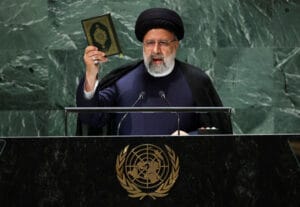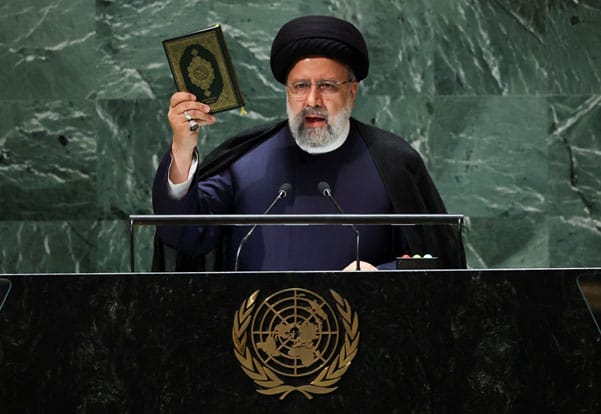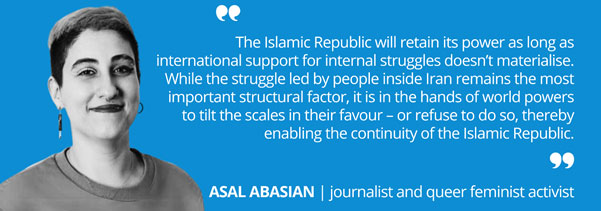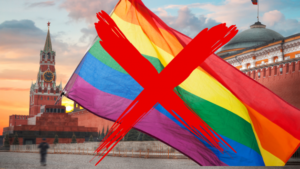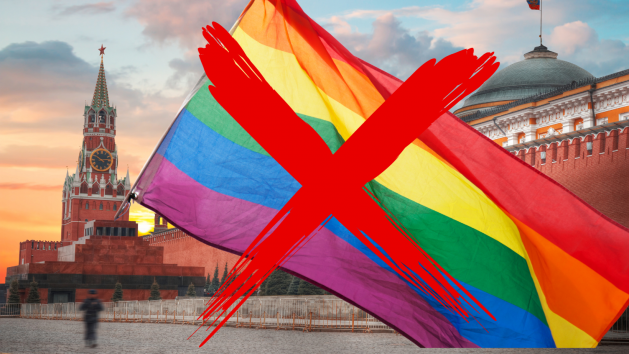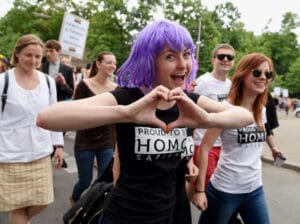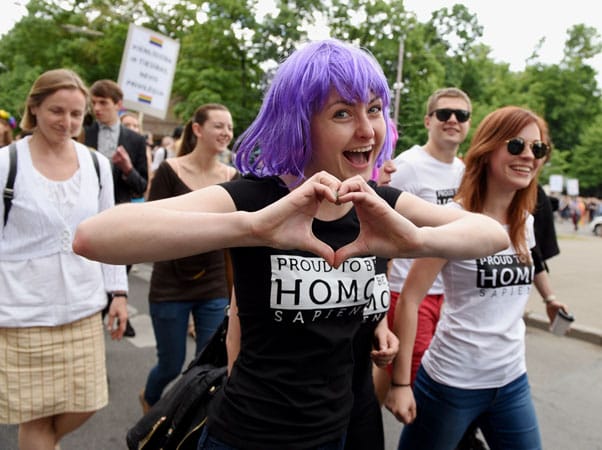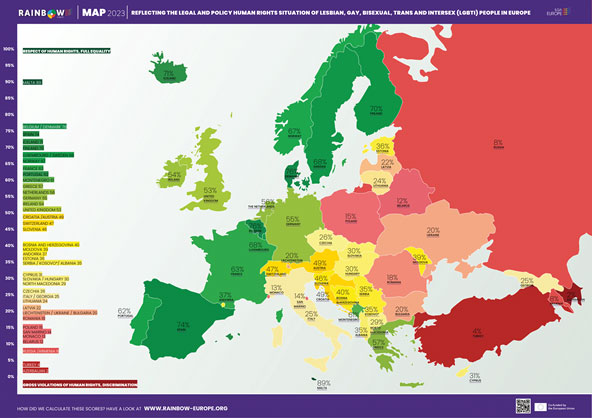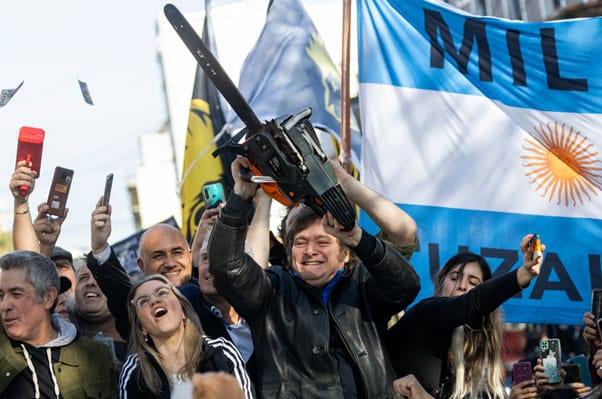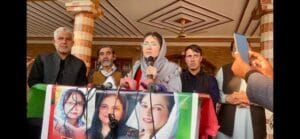
Asia-Pacific, Democracy, Editors’ Choice, Education, Featured, Freedom of Expression, Gender, Headlines, Human Rights, Population, Religion, TerraViva United Nations, Women in Politics, Women’s Health
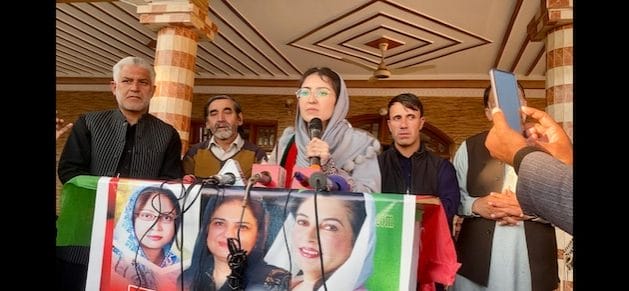
On the campaign trail: Dr Saveera Parkash, a nominee for the Pakistan People’s Party. She is the first Hindu woman to run in Pakistan’s general election Credit: Ashfaq Yusufzai/IPS
– A woman medical graduate from the Hindu community is making waves, as she is the first minority woman to contest the Pakistan Parliamentary election for a general seat, and she does so in the face of deep-rooted religious traditions and wealthy political opponents.
Dr Saveera Parkash, a nominee of the Pakistan People’s Party (PPP) for the February 8 polls, is sure of her victory despite her religion.
“I have been witnessing the support that I am getting from the Muslim-dominated district of Buner in Khyber Pakhtunkhwa province,” Parkash told IPS in an interview.
“My slogan is addressing issues of pollution, women’s empowerment, gender equality, female representation, and their health issues, in addition to ensuring respect for all religions,” she elaborated.
Born to a Christian mother and Hindu father, she has lived in a Muslim-dominated community; therefore, interfaith harmony is on her wishlist.
“Interfaith harmony is extremely significant because we have seen enmity among different religious sects on flimsy grounds.”
“We have to inculcate a sense of brotherhood among all schools of thought and pave the way for lasting peace in the area. We have to respect our religious places and shun differences, as all religions advocate peace and harmony,” she says.
Candidates in Buner, one of the 36 districts of Khyber Pakhtunkhwa that remained thick with militants from 2007 to 2010, are likely to witness a hard contest as the women and youngsters have shown support for the first-ever minority female candidate.
The Khyber Pakhtunkhwa Assembly, one of Pakistan’s four provinces, has 145 elected members, 115 regular seats, 26 reserved for women, and 4 for non-Muslims.
Pakistan is home to 4.4 million Hindus, which is 2.4 percent of the total population.
Her father, a medical doctor and late leader of the PPP and twice Prime Minister Benazir Bhutto, who was assassinated by militants in December 2007 in the garrison city of Rawalpindi, inspire her, she says.
“While my ideal is Mother Teresa, my main focus will be women’s education. The overall literacy rate is 48 percent, but only 25 percent of females are literate; therefore, I want to spread awareness about the importance of women’s education,” she says.
Additionally, it is very important to end favoritism and nepotism and ensure merit in the appointment of teachers, especially women.
After completing medical education in July 2022, she saw the issues women visiting hospitals faced and decided to enter politics instead of continuing her career as a doctor, as she believed issues needed to be resolved at the policy level.
“We need more women doctors, nurses, and paramedics to encourage female patients to visit hospitals. Currently, the number of female health workers is extremely low, due to which most of the women don’t come to hospitals because they don’t want to be seen by male doctors,” she says.
“My big advantage is that I belong to a middle-class family, and the people will vote for me because I am approachable to my electorate.”
The promotion of women’s rights is her main objective.
“We have to scale up awareness regarding women’s rights to property inheritance and their right to education. I sense victory in the polls, as I know the people listen to me and would reject opponents for their bright future.”
So, how does she feel the run-up to the election is going?
“In our district, 75 percent of voters are under 30, and they are well-informed about the issues they are facing. I may be lacking wisdom and knowledge compared to senior politicians, but my sincerity will lead to my success,” says the 25-year-old, who routinely wears a headscarf.
Because she is trying to reach a young electorate, her campaigning includes the wide use of social media, apart from the traditional approaches of public meetings and house-to-house canvassing.
Highlighting corruption is also part of her election campaign.
At the moment, she is concentrating on a smooth run-up so she can win popular support in her constituency
“Voters in my constituency call me ‘sister’ and ‘daughter,’ which gives me immense strength,” she said.
Parkash said she wanted to follow in the footsteps of her father, Oam Prakash, a retired doctor, and serve the people.
Securing a space for women is vital for development, as they have been suppressed and neglected in all areas.
She said “serving humanity is in my blood” due to her medical background, highlighting that her dream to become an elected legislator stemmed from having experienced poor management and helplessness in government hospitals as a doctor.
Most people in the area endorse her candidacy, regardless of her Hinduism or political affiliation. Voters appreciate her bravery for challenging traditional policies
The Election Commission of Pakistan makes it mandatory for all political parties to award 5 percent of seats to women in general seats.
Political analyst Muhammad Zahir Shah, at the University of Peshawar, said that Parkash has created history by contesting the general election.
“We have been seeing women becoming members of the assembly on reserved seats. They don’t contest elections but are nominated by parties on the basis of the seats they win in the election,” Shah said.
In the past, some women have fought elections, but they were Muslim; therefore, they don’t draw as much media and public attention, but the case of Parkash is unprecedented.
She is well educated and belongs to the Hindu community while standing for vote in an area where 95 percent of the voters are Muslims.
“She is contesting on the PPP’s ticket, which isn’t a popular political party, but it seems that she will make her presence felt during the electioneering,” Shah said. Already, she has hit headlines, and if the election takes place in a fair and transparent manner, there is a greater likelihood that she will emerge victorious,” he said.
IPS UN Bureau Report

